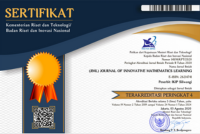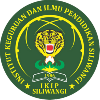The Comparison of Mathematical Communication Capabilities Students Who Get The Think Talk Write (TTW) Learning Model and Group Investigation (GI) Learning Model
DOI:
https://doi.org/10.22460/jiml.v3i4.p227-238Keywords:
Mathematical communication skills, Think Talk Write (TTW) models, Group Invertigation (GI) models.Abstract
This study is a quasi-experimental study that aims to compare the mathematical communication skills between students who get the Think Talk Write (TTW) learning model and the Group Investigation (GI) Learning Model, examine their quality improvement and examine students' attitudes towards Think Talk Write (TTW) learning models. ) and Group Investigation (GI) Learning Models.
The population in this study were all students of class VIII 1 of Leuwigoong Junior High School, with a sample of two classes, namely: class VIII-E as the experimental first class who received the Think Talk Write (TTW) learning model and class VIII-H as the experimental second class that obtained the Model Group Investigation (GI) Learning. The instrument used was a description of mathematical communication skills and attitude scale. The results of data analysis showed that the mathematical communication skills of students who got the Think Talk Write (TTW) learning model were no better than those who received the Group Investigation (GI) Learning Model. Quality Improvement of mathematical ability of experimental first class students who get the Think Talk Write (TTW) learning model with the moderate category and for the improvement of mathematical communication skills of the experimental second class students who receive the Group Invertigation (GI) learning model with the moderate category, and for student attitudes towards mathematics learning using Think Talk Write (TTW) and Invertigation learning models (GI) both interpret well.
Keywords: Mathematical communication skills, Think Talk Write (TTW) models, Group Invertigation (GI) models.
References
Fariyah (2013). Application of the Group Investigation (GI) cooperative learning model, to improve student activity and learning outcomes. [Onlne]. Available: http://lib.unnes.ac.id/19240/1/7101408279.pdf.
Izzati, N. & Suryadi, D. (2010). Mathematical Communication and Realistic Mathematics Education. The paper was presented at the Nasinal Seminar at the Mathematics Education Department of FMIPA UNY, Yogyakarta on November 27, 2010.
Ramdhani N. (2014) Effect of Quantum Teaching Learning Model Using Information Technology and Communication (Tik) Against Students' Mathematical Communication Capabilities. STKIP Garut: Not published
Shadiq, F. (2007). Report on the Results of Seminar and Workshop on Learning Mathematics in the Mathematics Teacher Study Program on March 15-16, 2007. Available at http://fadjar3g.files.wordpress.com/ 2008/06/07-lapsemlok_limas.pdf.
Turmudi. (2008). Solving Mathematical Problems. [On line]. Available: http://file.upi.edu/Dirirect/FPMIPA/Jur._Pend._Matematika/196101121987031-Turmudi/F20-Pemecahan_Masalah_Matematika-1-11-2008.pdf.

























